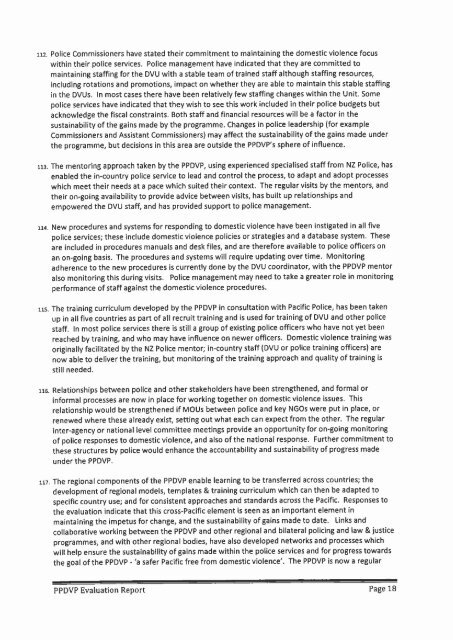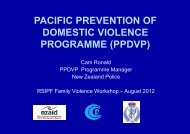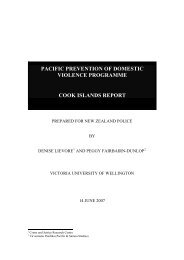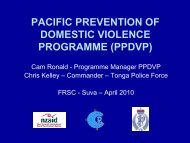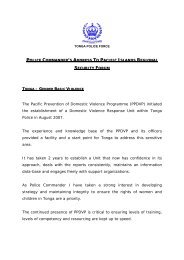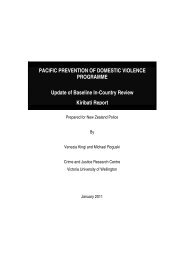PPDVP Evaluation Report - Pacific Prevention of Domestic Violence ...
PPDVP Evaluation Report - Pacific Prevention of Domestic Violence ...
PPDVP Evaluation Report - Pacific Prevention of Domestic Violence ...
You also want an ePaper? Increase the reach of your titles
YUMPU automatically turns print PDFs into web optimized ePapers that Google loves.
112. Police Commissioners have stated their commitment to maintaining the domestic violence focuswithin their police services. Police management have indicated that they are committed tomaintaining staffing for the DVU with a stable team <strong>of</strong> trained staff although staffing resources,including rotations and promotions, impact on whether they are able to maintain this stable staffingin the DVUs. In most cases there have been relatively few staffing changes within the Unit. Somepolice services have indicated that they wish to see this work included in their police budgets butacknowledge the fiscal constraints. Both staff and financial resources will be a factor in thesustainability <strong>of</strong> the gains made by the programme. Changes in police leadership (for exampleCommissioners and Assistant Commissioners) may affect the sustainability <strong>of</strong> the gains made underthe programme, but decisions in this area are outside the <strong>PPDVP</strong>'s sphere <strong>of</strong> influence.113. The mentoring approach taken by the <strong>PPDVP</strong>, using experienced specialised staff from NZ Police, hasenabled the in-country police service to lead and control the process, to adapt and adopt processeswhich meet their needs at a pace which suited their context. The regular visits by the mentors, andtheir on-going availability to provide advice between visits, has built up relationships andempowered the DVU staff, and has provided support to police management.114. New procedures and systems for responding to domestic violence have been instigated in all fivepolice services; these include domestic violence policies or strategies and a database system. Theseare included in procedures manuals and desk files, and are therefore available to police <strong>of</strong>ficers onan on-going basis. The procedures and systems will require updating over time. Monitoringadherence to the new procedures is currently done by the DVU coordinator, with the <strong>PPDVP</strong> mentoralso monitoring this during visits. Police management may need to take a greater role in monitoringperformance <strong>of</strong> staff against the domestic violence procedures.11s. The training curriculum developed by the <strong>PPDVP</strong> in consultation with <strong>Pacific</strong> Police, has been takenup in all five countries as part <strong>of</strong> all recruit training and is used for training <strong>of</strong> DVU and other policestaff. In most police services there is still a group <strong>of</strong> existing police <strong>of</strong>ficers who have not yet beenreached by training, and who may have influence on newer <strong>of</strong>ficers. <strong>Domestic</strong> violence training wasoriginally facilitated by the NZ Police mentor; in-country staff (DVU or police training <strong>of</strong>ficers) arenow able to deliver the trai~ing, but monitoring <strong>of</strong> the training approach and quality <strong>of</strong> training isstill needed.116. Relationships between police and other stakeholders have been strengthened, and formal orinformal processes are now in place for working together on domestic violence issues. Thisrelationship would be strengthened if MOUs between police and key NGOs were put in place, orrenewed where these already exist, setting out what each can expect from the other. The regularinter-agency or national level committee meetings provide an opportunity for on-going monitoring<strong>of</strong> police responses to domestic violence, and also <strong>of</strong> the national response. Further commitment tothese structures by police would enhance the accountability and sustainability <strong>of</strong> progress madeunder the <strong>PPDVP</strong>.117. The regional components <strong>of</strong> the <strong>PPDVP</strong> enable learning to be transferred across countries; thedevelopment <strong>of</strong> regional models, templates & training curriculum which can then be adapted tospecific country use; and for consistent approaches and standards across the <strong>Pacific</strong>. Responses tothe evaluation indicate that this cross-<strong>Pacific</strong> element is seen as an important element inmaintaining the impetus for change, and the sustainability <strong>of</strong> gains made to date. Links andcollaborative working between the <strong>PPDVP</strong> and other regional and bilateral policing and law &justiceprogrammes, and with other regional bodies, have also developed networks and processes whichwill help ensure the sustainability <strong>of</strong> gains made within the police services and for progress towardsthe goal <strong>of</strong> the <strong>PPDVP</strong> - 'a safer <strong>Pacific</strong> free from domestic violence'. The <strong>PPDVP</strong> is now a regular<strong>PPDVP</strong> <strong>Evaluation</strong> <strong>Report</strong> Page 18


